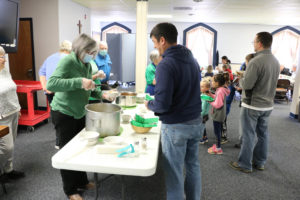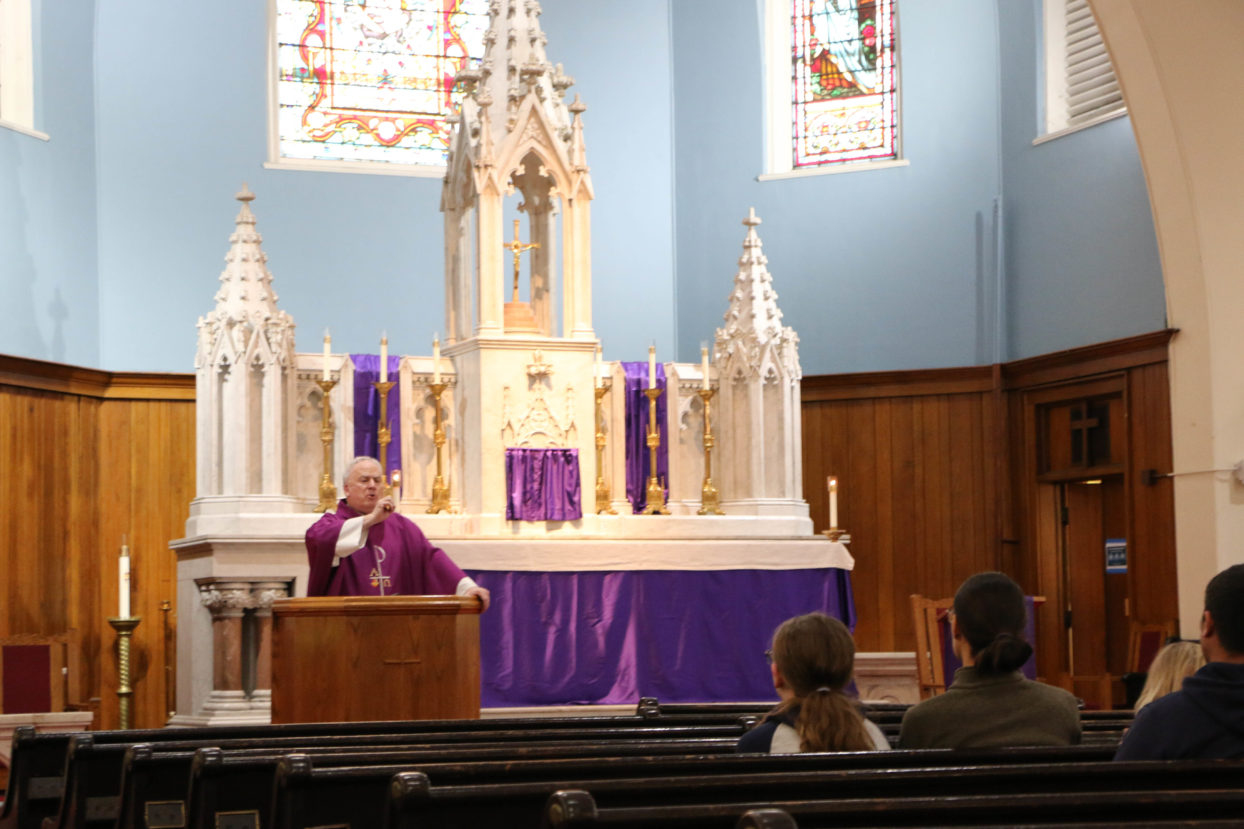Does God’s Plan for Salvation include you? IC Lenten ecumenical service offers a map to penance
By Bill Brewer
In the holiest spirit of neighborly ecumenism, downtown Knoxville churches celebrated the Lenten season leading into Easter by sharing each other’s faith practices, and Immaculate Conception Church was at the forefront.
Immaculate Conception, the Diocese of Knoxville’s second oldest parish (established in 1855), hosted the “Downtown Knoxville Churches Lenten Worship & Lunch Series” with a March 16 ecumenical service and shared meal.
In addition to the Catholic faithful, members of churches in Knoxville’s center city attended the service. Among the area’s Christian churches are Emmanuel Church, First Presbyterian, St. John’s Episcopal Cathedral, and First Baptist. Emmanuel Church began the Lenten celebration with a service on March 9, followed in successive weeks by Immaculate Conception, First Presbyterian, St. John’s Episcopal, and then First Baptist leading into Holy Week.
Father Tim Sullivan, CSP, associate pastor at Immaculate Conception, led the March 16 service and delivered the homily. Among the songs played during the Lenten ecumenical service were “Amazing Grace,” “He’s Got the Whole World in His Hands,” and “Lift High the Cross,” which are staples in Protestant as well as Catholic churches.
In his opening prayer, Father Sullivan thanked God for the Lenten season, which allows believers to conform their minds, hearts, and souls with God’s as they approach Holy Week. Father Sullivan also asked God to bless the churches in the downtown Knoxville area and throughout the world as well as their ministers, lay leaders, and members, and help them to continue building God’s kingdom.
The day’s Gospel reading, Mark 10:46-52, was about blind Bartimaeus receiving his sight from Jesus.
In his homily, Father Sullivan singled out the hymn “Amazing Grace” and its writer, the English poet and slave ship captain John Newton. During his conversion to Christianity in the mid-1700s, it was reported that Mr. Newton began to acknowledge the slaves shackled on his ship as children of God, and on one slave-trading voyage he reversed course and released the slaves on board back in their native land. He had become an Anglican priest in England when he wrote “Amazing Grace.”
“He had insight into his spiritual blindness. ‘I once was lost, but now am found; was blind but now I see.’ It speaks of Jesus’ beautiful healing of the blind Bartimaeus from our reading,” Father Sullivan said.
“Bartimaeus is a great role model for us during Lent. What blindness do we have? What feelings, attitudes do we hold on to that entrap us into lives of judgment, derision, hatred? In what ways are we blind to those neighbors in our midst crying out for help: the homebound, elderly grandmother who has not had a visitor in many months? Are our eyes open to her needs, to those without shelter, without food? How do we reach out with compassion to them?” he asked.
He pointed out that Bartimaeus had faith to come to Jesus for healing and asked how we become dependent on Jesus Christ, our Lord.
Father Sullivan offered words from a favorite poster he was given that refer to the three cardinal virtues—faith, hope, and love: Faith is how we know where we’re going; hope keeps us going; but love is how we get there.
“Faith. Is our faith growing during these 40 days? Will we walk with Jesus to the cross on Good Friday? How is it that faith can guide us in troubled times when we’re lost and feeling blind? Faith, in some ways I like to call it the GPS system for our daily living. Not the global positioning system, the miraculous way that satellites guide us to the nearest Wendy’s restaurant. But God’s Plan for Salvation. GPS,” Father Sullivan said.
“Hope. Are we a hopeful people? Are we aware of the blessing that God has bestowed upon us? Does that inspire us to live lives of holiness, a service to the building of God’s kingdom?” he continued.
“And, of course, love—the centerpiece of our lives. The gift of Jesus’ love to all of us,” he concluded.
Father Sullivan reminded the congregation that Bartimaeus, with his new sight, began to follow Jesus.
The Paulist priest then sang a verse from a song by gospel singer Amy Grant: “Thy Word is a lamp unto my feet and light unto my path.”
“We Catholics can learn from our Protestant brothers and sisters about the sacred Scriptures. I think we all (Catholics) got C-minuses in this class as we come to you (Protestants) with a desire to learn, to delve into Scripture more fully, to see how the Word can impact our lives. We thank you for your wonderful example of knowing the Scriptures so well over these many years,” he said.

Lunch is served in the Immaculate Conception Parish hall following an ecumenical service for downtown Knoxville churches.
“We pray together that we can involve ourselves more fully in the grace, the blessings of this Lenten season. We pray especially that our eyes will be opened, that our spiritual blindness may be healed by the Lord, that we may see with the eyes of our Creator, seeing the beauty in all creation and each and every human being made in God’s divine image,” he continued. “May our eyes and our hearts be opened this season that we may walk together to praise God through our words and deeds and help in the building of God’s kingdom here in Knoxville and throughout the world.”
Among those in attendance were Steve Underwood, his wife, and their young great-niece and great-nephew. Mr. and Mrs. Underwood belong to First Baptist Church.
“It was a great service. It brings people together from different walks of life. We see different things in the churches that are beautiful. We see the traits that Catholics follow, which are a little different than ours. It all works out, though. The bottom line is our Christ, and that is what we’re here for. All of us are here for that. We felt it from the heart,” Mr. Underwood said.
The Underwoods attended with the Rev. Brent McDougal, senior pastor of First Baptist Church, who relishes the opportunity to share in different faith practices.
“I love it when we come together to experience how people from different traditions practice their faith. We can share in celebrating the centerpiece of our common faith: the cross and resurrection of Jesus Christ. There’s a beautiful spirit that emerges when we gather for worship and a meal,” the Rev. McDougal said. “Not only do we see the different spaces where people worship downtown, but we also catch a glimpse of how worship flows and how people talk about their faith. We gain unity and embrace our common mission of being a blessing in the heart of Knoxville.
The Rev. McDougal believes not only in God and His son, Jesus, he also believes that shared belief represented in the Downtown Lenten Worship & Lunch Series can lead to more ecumenism.
“I do believe that we have more in common than we do that divides us. Being exposed to the various traditions of faith helps us to remember that even though we have differences, the love of Christ is like a banner over us all. That kind of united love can be a beacon for a divided world,” he said.
Father Charlie Donahue, CSP, pastor of Immaculate Conception, is a firm believer in ecumenical outreach and the fruit of that labor. He cites Pope St. John Paul II and his Ut unum sint (That they all may be one), pointing out that the Catholic Church embraces with hope the commitment to ecumenism as a duty of the Christian conscience enlightened by faith and guided by love.
“In a world and at a time of growing unbelief, it is important for believers to come together in common witness,” Father Donahue said. “It is so great to come together—not only as ministers as we do throughout the year—but during this season of Lent with our church members as well.”
“It is good to expose each other to our prayer and worship practices. So often we see stereotypes of how other churches gather and worship. It is important, too, that we see the lived reality of our neighbors. As Paulist Fathers, Father Tim and I have a special calling toward ecumenism (relationships with non-Catholic Christians) and dialogue,” Father Donahue noted.
“It is an important part of our charism,” he added. “About a decade ago I was able to study with the Centro Pro Unione in Rome. It is offered by the Franciscan Friars of the Atonement and The Pontifical Council for Promoting Christian Unity. I learned there not only about the ‘irrevocable commitment’ to ecumenism but also how to engage with one another in charity, openness, and willingness to know, understand, and share our faith.”
Father Donahue is confident the shared experience of the ecumenical services will work in reverse, too.
“This may seem counterintuitive, but each will come away with a deeper understanding and wonder about their own faith. Our prayerful relationship with Christ and one another in an environment of a hospitable meal-sharing leads us to a deeper appreciation of our own tradition and fellowship. Think of the Emmaus encounter, the encounter of the Apostles with the risen Jesus as he bakes them a fish breakfast. ‘When two or three are gathered in my name, there I am among you,’ as Jesus says (Matthew 18:20),” he said.
He sees how exposure to other faith practices can illustrate similarities and differences in the shared belief in God.
“There are real differences in how our traditions teach us about how God saves us, and there are commonly held beliefs. The Nicene Creed is an excellent starting point. It should do our hearts good to know that so many non-Catholic Christians do find unity in the reciting of the Creed, in works of service, and in common witness,” Father Donahue continued.
He concludes that it is possible to build on this ecumenical outreach and the shared experiences. “But it is indeed, as the Psalms say, ‘Deep calls to deep’ (Psalm 42:8). If we know and love our faith and traditions deeply, it enables us to engage other followers of Christ. The Acts of the Apostles recounts Peter being at the house of Cornelius and witnessing the fire and boldness of the Holy Spirit. He is surprised at how God is working in communities that seek a deeper understanding of the presence of Christ.”

